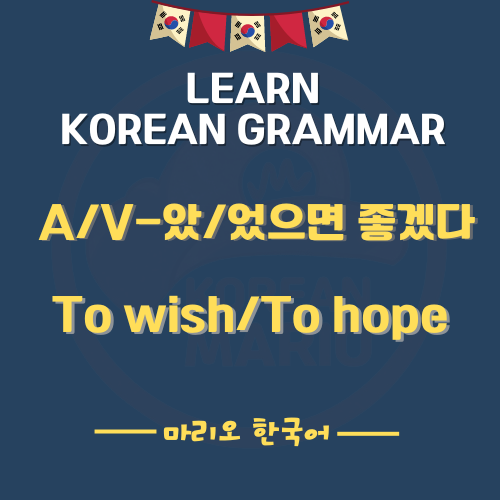
In English, “A/V-았/었으면 좋겠다” translates to “I wish (something) had happened” or “It would have been nice if (something) had happened.”
Here, “A/V” stands for an action or verb, and “았/었으면” is a grammatical structure used to express a conditional wish or desire regarding a past event. “좋겠다” translates to “would be good” or “would be nice.”
So, when combined, “A/V-았/었으면 좋겠다” conveys the sentiment of wishing that something had occurred in the past.
Learn more daily content on Instagram!
Korean Grammar A/V-았/었으면 좋겠다
| ending in ㅏ / ㅗ + 았으면 좋겠다 | ending in vowel other than ㅏ / ㅗ + 었으면 좋겠다 | ending in 하다 + 했으면 좋겠다 |
| 자다 → 잤으면 좋겠다 | 먹다 → 먹었으면 좋겠다 | 공부하다 → 공부했으면 좋겠다 |
| 오다 → 왔으면 좋겠다 | 길다 → 길었으면 좋겠다 | 따뜻하다 → 따뜻했으면 좋겠다 |
| 작다 → 작았으면 좋겠다 | 있다 → 있었으면 좋겠다 | 여행하다 → 여행했으면 좋겠다 |
| 가다 → 갔으면 좋겠다 | 쉬다 → 쉬었으면 좋겠다 | 결혼하다 → 결혼했으면 좋겠다 |
to sleep 자다 → 잤으면 좋겠다 I wish I could sleep
to come 오다 → 왔으면 좋겠다 I wish I could come
to be small 작다 → 작았으면 좋겠다 I wish it could be small
to go 가다 → 갔으면 좋겠다 I wish I could go
to eat 먹다 → 먹었으면 좋겠다 I wish I could eat
to be long 길다 → 길었으면 좋겠다 I wish it could be long
to have 있다 → 있었으면 좋겠다 I wish I have
to rest 쉬다 → 쉬었으면 좋겠다 I wish I could rest
to study 공부하다 → 공부했으면 좋겠다 I wish I could study
to be warm 따뜻하다 → 따뜻했으면 좋겠다 I wish it could be warm
to travel 여행하다 → 여행했으면 좋겠다 I wish I could travel
to get married 결혼하다 → 결혼했으면 좋겠다 I wish I could get married
- 과자를 사왔으면 좋겠다. (I wish I had bought some snacks.)
- 어제 파티에 갔었으면 좋겠다. (I wish I had gone to the party yesterday.)
- 시간이 더 있었으면 좋겠다. (I wish there was more time.)
- 그 영화를 봤으면 좋겠다. (I wish I had watched that movie.)
- 그녀를 만났으면 좋겠다. (I wish I had met her.)
- 더 일찍 일어났으면 좋겠다. (I wish I had woken up earlier.)
- 그 책을 읽었으면 좋겠다. (I wish I had read that book.)
- 그 전화를 받았으면 좋겠다. (I wish I had answered that phone call.)
- 여행을 했으면 좋겠다. (I wish I had traveled.)
-(으)면 좋겠다
-(으)면 좋겠다 can be used in the same sense as -았/었으면 좋겠다 but because 았/었으면 좋겠다 supposes the realization of an as yet unrealized state, it more strongly emphasizes the verb.
시간이 있으면 좋겠어요. (The speaker is wishing to have more time.)
시간이 있었으면 좋겠어요. (The speaker is supposing a situation in which he has lots of time, which is in contrast to his current situation of having no time, thus the wish is emphasized.)
- 내일 날씨가 좋으면 좋겠다. (I hope the weather is nice tomorrow.)
- 시간이 있으면 좋겠다. (I hope there is time.)
- 시험에 합격하면 좋겠다. (I hope to pass the exam.)
- 만약에 그녀가 도와주면 좋겠다. (I hope she helps.)
- 휴가를 받으면 좋겠다. (I hope to get a vacation.)
- 저녁에 비가 그치면 좋겠다. (I hope the rain stops in the evening.)
- 내가 이 일을 해결하면 좋겠다. (I hope I can solve this problem.)
- 그 영화가 재미있으면 좋겠다. (I hope the movie is entertaining.)
- 내일 일찍 일어나면 좋겠다. (I hope to wake up early tomorrow.)
- 시간이 남으면 좋겠다. (I hope there is extra time.)
- 친구가 내 생일을 기억하면 좋겠다. (I hope my friend remembers my birthday.)
- 만약에 계획이 성공하면 좋겠다. (I hope the plan succeeds.)
- 날씨가 추우면 좋겠다. (I hope the weather is cold.)
- 우리가 함께 여행을 가면 좋겠다. (I hope we can travel together.)
- 오늘 일정이 원할하면 좋겠다. (I hope today’s schedule goes smoothly.)
Learn Korean With More Blogs

- EPS Free Course
- Learn with BTS
- Numbers and Words
- Travel and Daily Korean
- TOPIK
- Hangul – The Korean Alphabets
- Beginner Grammar
- Intermediate Grammar
- Tools Names
Table of Contents

